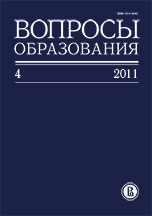Интеллектуальная нищета высоких стремлений
Аннотация
Анализируются проблемы и перспективы духовно-нравственного, морального и гражданского образования в российских школах. Рассматриваются два противоположных подхода в отношении ценностного воспитания: пропаганда, с одной стороны, и открытое воспитание — с другой. Первый подход связан с простыми решениями: массовизацией воспитания, интеграцией вербализованных ценностей в учебное содержание, насаждением единых стандартов, «духовных» шаблонов и императивов. Такая парадигма рассматривает культурно дифференцированное общество и многообразие ценностных ориентаций редуцированно, в упрощенных представлениях о структуре системы ценностей и механизмах ее становления. За кадром остаются вопросы о педагогических технологиях и методах, которые бы учитывали индивидуальный опыт учащихся. Духовность отождествляется с религиозностью. Второй, «опытный» подход основан на идее опосредованного формирования ценностей, т. е. естественного, протекающего в процессе практической деятельности, переживания, размышления и рефлексии. Подчеркивается необходимость смещения фокуса с тотальных форм нравственного воспитания на более динамичный индивидуализированный подход к воспитательной деятельности.








